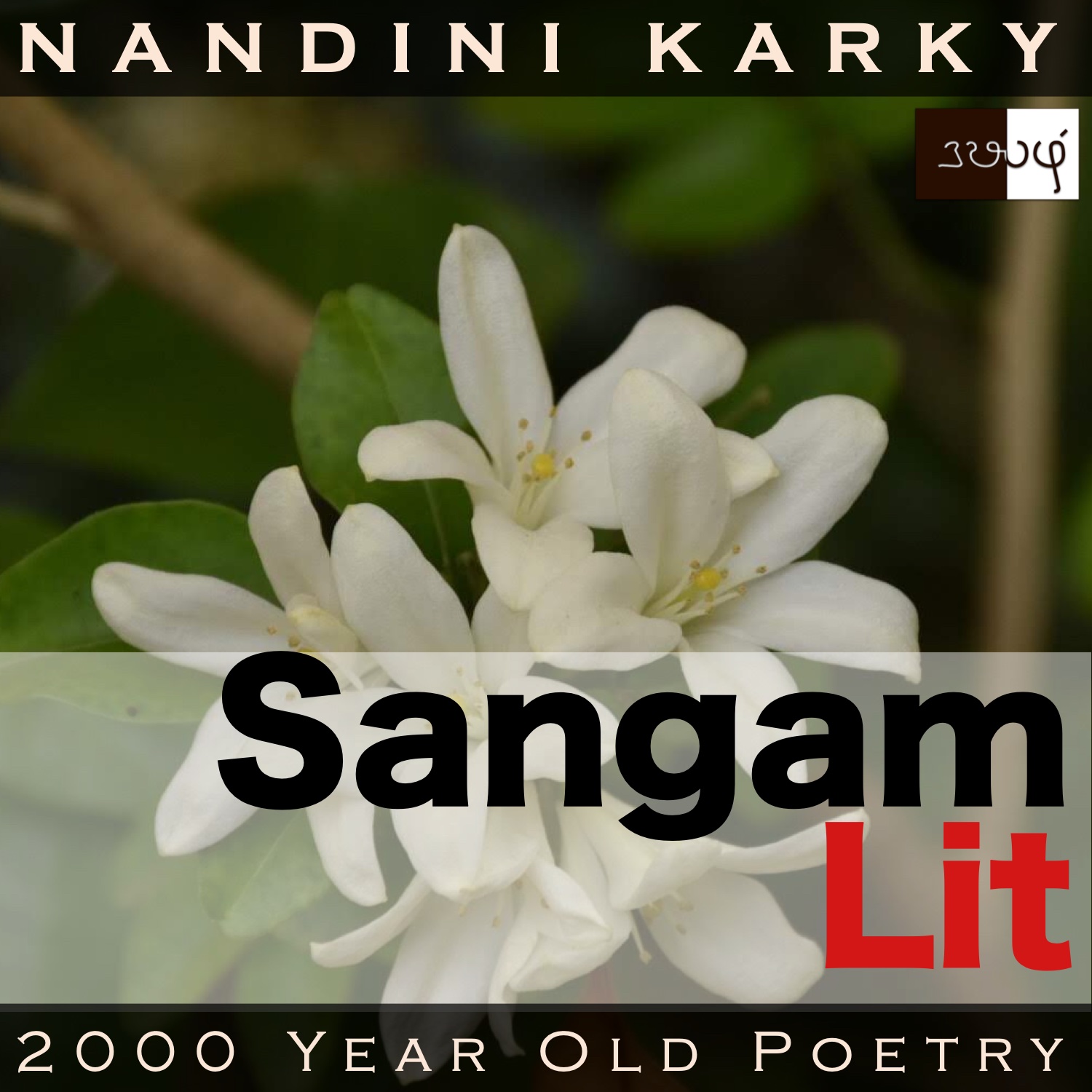Podcast: Play in new window | Download
Subscribe: Apple Podcasts | Spotify | Amazon Music | Android | iHeartRadio | TuneIn | RSS | More

In this episode, we listen to a lady in angst, as depicted in Sangam Literary work, Kurunthogai 220, penned by Okoor Maasathiyaar. Set in the forest regions of ‘Mullai’, the verse speaks in the voice of the lady to her confidante, expressing her sorrow as the man continued to stay away.
பழமழைக் கலித்த புதுப்புன வரகின்
இரலை மேய்ந்த குறைத்தலைப் பாவை
இருவிசேர் மருங்கிற் பூத்த முல்லை
வெருகு சிரித்தன்ன பசுவீ மென்பிணி
குறுமுகை அவிழ்ந்த நறுமலர்ப் புறவின்
வண்டு சூழ் மாலையும் வாரார்
கண்டிசின் தோழி, பொருள் பிரிந்தோரே.
‘Jasmine blooms and he comes not’ is the yearning thought in this verse. In the opening words ‘பழமழைக் கலித்த புதுப்புன வரகின்’ meaning ‘the proso millet that sprouted in the newly prepared field owing to the previous rains’, we glimpse at the consequence of the recent showers. Note how the Tamil word for proso millet – ‘varugu’ continues to remain the same two thousand years onward. Returning, we glimpse at a ‘male deer’ in ‘இரலை’. This is followed by the ubiquitous flowers that gives this region its name in ‘முல்லை’ referring to ‘wild jasmines’. There’s a plant-animal connection that appears in ‘வெருகு சிரித்தன்ன’ meaning ‘smiling akin to a wild cat’. The painful time of the day for parted lovers can be seen in ‘வண்டு சூழ் மாலை’ or ‘bee-buzzing evening’. Ending with the words ‘பொருள் பிரிந்தோரே’ meaning ‘he who parted away for wealth’, the verse beckons us to listen with empathy.
A floral delight that seems to cause an ache! The context reveals that the man and lady were leading a happy, married life when the man parted away to gather wealth. The lady languished in his absence and one day, turns to her confidante and says, “The millet that flourished in the new fields after the recent rains is grazed on by the male deer. Those resulting shortened millet stalks are hedged by wild jasmine, whose little buds are softly closed and fresh, ready to bloom, looking like a wild cat’s smile, in that fragrant forest land, during this bee-buzzing evening. Note this, my friend, still, he comes not, the one who parted away to earn wealth!” With these words, the lady tells the confidante that she’s anguished by the man’s absence even after the promised season of return.
Yet again, it’s the same theme of parting and pining. Let’s explore to see if we can discover any new nuances. The lady talks about a millet crop shooting up after the rains and this being a magnet for grazing deer, the crop finds itself shortened in stature. After mentioning this, the lady turns to focus on what’s near this millet crop and that’s the wild jasmine plant, with buds in a delicate half-open state, looking like the smile of a wild cat. Previously, we have seen these wild jasmine flowers equated to the smile of a lady but here is a wild cat reference. Perhaps, when the wild cat moves its mouth to make a call, it looks as if it is smiling and this image seems to have fallen in the eyes of the poet and found its way into the verse. That’s an illustration of the power of observation and creativity, which finds uncommon connections among the common sights of the world!
Returning, the lady continues about how it’s an evening when bees are delighting around in the fragrance in the forest land and concludes saying the man is not back still. That wild jasmines are ready to bloom and bees have started getting excited indicates clearly to the lady the season of rains is here, which happens to be the promised time for the man’s return. And so, the lady exclaims about her pain at this disappointment. The good thing is the lady has someone to talk to, to share her suffering and that makes a huge difference, doesn’t it? Here’s to all those people, like this comforting confidante, whose quiet presence helps us tide over the stormy moments of our lives!




Share your thoughts...